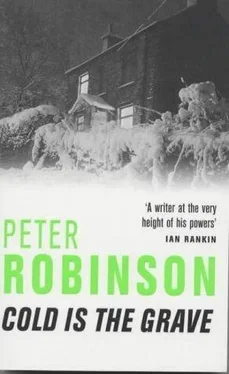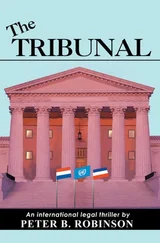
Peter Robinson
Cold Is The Grave
Book 11 in the Inspector Banks series, 2000
THE WIND IT DOTH BLOW HARD
AND THE COLD RAIN DOWN DOTH RAIN
AND COLD, COLD IS THE GRAVE
WHEREIN MY LOVE IS LAIN
– TRADITIONAL FOLK BALLAD
“Mummy! Mummy! Come here.”
Rosalind carried on stuffing the wild mushroom, olive oil, garlic and parsley mixture between the skin and the flesh of the chicken, the way she had learned in her recent course on the art of French cuisine. “Mummy can’t come right now,” she shouted back. “She’s busy.”
“But, Mummy! You’ve got to come. It’s our lass.”
Where on earth did he learn such common language? Rosalind wondered. Every term they forked out a fortune in fees to send him to the best school Yorkshire had to offer, and still he ended up sounding like some vulgar tyke. Perhaps if they lived down south again, the situation would improve. “Benjamin,” she called back. “I told you. Mummy’s busy. Daddy has an important dinner tonight and Mummy has to prepare.”
Rosalind didn’t mind cooking – in fact, she had taken several courses and quite enjoyed them – but just for a moment, as she spoke, she wished she had been able to say that “cook” was preparing the meal and that she was busy deciding what to wear. But they had no cook, only a cleaning lady who came in once a week. It wasn’t that they couldn’t afford it, but simply that her husband drew the line at such extravagance. Honestly, Rosalind sometimes thought, anyone would imagine he was a born Yorkshireman himself instead of just living here.
“But it is her!” Benjamin persisted. “It’s our lass. She’s got no clothes on.”
Rosalind frowned and put aside her knife. What on earth could he be talking about? Benjamin was only eight, and she knew from experience that he had a very active imagination. She even worried that it might hold him back in life. Over-imaginative types, she had found, tend toward idleness and daydreaming; they don’t get on with more profitable activities.
“Mummy, hurry up!”
Rosalind felt just the slightest tingle of apprehension, as if something were about to change forever in her universe. Shaking off the feeling, she wiped her hands of the oily stuffing, took a quick sip of gin and tonic, then walked toward the study, where Benjamin had been playing on the computer. As she did so, she heard the front door open and her husband call out that he was home. Early. She frowned. Was he checking up on her?
Ignoring him for the moment, she went to see what on earth Benjamin was talking about.
“Look,” the boy said as she walked into the room. “It is our lass.” He pointed at the computer screen.
“Don’t talk like that,” Rosalind said. “I’ve told you before. It’s common.”
Then she looked.
At first, she was simply shocked to see the screen filled with the image of a naked woman. How had Benjamin stumbled onto such a site? He wasn’t even old enough to understand what he had found.
Then, as she leaned over his shoulder and peered more closely at the screen, she gasped. He was right. She was looking at a picture of her daughter, Emily, naked as the day she was born, but with considerably more curves, a tattoo and a wispy patch of blond pubic hair between her legs. That it was her Emily, there was no mistake; the teardrop-shaped birthmark on the inside of her left thigh proved it.
Rosalind ran her hand through her hair. What was this all about? What was happening? She glanced briefly at the URL on top of the screen. She had a photographic memory, so she knew she wouldn’t forget it.
“See,” said Benjamin. “It is our lass, isn’t it. What’s she doing without any clothes on, Mummy?”
Then Rosalind panicked. My God, he mustn’t see this. Emily’s father. He mustn’t be allowed to see it. It would destroy him. Quickly, she reached toward the mouse, but before her fingers could click on it, a deep voice behind her told her it was too late.
“What on earth’s going on?” he asked mildly, putting a fatherly hand on his son’s shoulder.
Then, after the briefest of silences, Rosalind heard the sharp intake of breath and knew that he had the answer.
His hand tightened and Benjamin flinched. “Daddy, you’re hurting me.”
But Chief Constable Jeremiah Riddle was oblivious to his son’s pain. “My God!” he gasped, pointing at the screen. “Is that who I think it is?”
Detective Chief Inspector Alan Banks paused over his holdall, wondering whether he should take the leather jacket or the Windcheater. There wasn’t room for both. He wasn’t sure how cold it would be. Probably no different from Yorkshire, he guessed. At most, perhaps a couple of degrees warmer. Still, you never could tell with November. In the end, he decided he could take both. He folded the Windcheater and put it on top of the shirts he had already packed, then he pressed down hard on the contents before dragging the reluctant zip shut. It seemed a lot for just one weekend away from home, but it all fitted into one not-too-heavy bag. He would wear his leather jacket on the journey.
All he had to do now was choose a book and a few tapes. He probably wouldn’t need them, but he didn’t like to travel anywhere without something to read and something to listen to in case of delays or emergencies.
It was a lesson he had learned the hard way, having once spent four hours in the casualty department of a large London hospital on a Saturday night waiting to have six stitches sewn beside his right eye. All that time, he had held the gauze pad to stanch the bleeding and watched the endless supply of drug overdoses, attempted suicides, heart-attack victims and road accidents going in before him. That their wounds were far more serious and merited more urgent treatment than his minor cut, Banks never had a moment’s doubt, but he wished to hell there had been something to read in the dingy waiting area other than a copy of the previous day’s Daily Mirror . The person who had read it before him had even filled in the crossword. In ink .
But tomorrow he was going to Paris with his daughter Tracy for a long weekend of art galleries, museums and walks, of sumptuous dinners in small Left Bank restaurants and idle beers at zinc-topped counters in Montmartre, looking out on the crowds passing by. They were going to take the Eurostar, which Banks had managed to book practically for free through a special newspaper offer. After all, it was November, and most people preferred Lanzarote to a wet weekend in Paris. He probably wouldn’t need much in the way of music or books, except when he was alone in his room before bed, but he decided to err on the side of caution.
Banks carried the holdall downstairs and dug out a couple of extra batteries from the sideboard drawer. He slipped them in the side pouch, along with the Walkman itself, then picked out tapes he had made of his Cassandra Wilson, Dawn Upshaw and Lucinda Williams CDs. Three more different women’s voices and styles you probably couldn’t find anywhere on earth, but he liked them all, and between them they covered a wide range of moods. He cast an eye over the low bookshelf and picked out Simenon’s Maigret and the Hundred Gibbets . He didn’t usually read crime novels, but the title had caught his eye and someone had once told him that he had a lot in common with Maigret. Besides, he assumed that it was set in Paris.
When Banks had finished packing, he poured himself a couple of fingers of Laphroaig and put on Bill Evans’s Waltz for Debby CD. Then he sat in his armchair beside the shaded reading lamp, balanced the whiskey on the arm and put his feet up as “My Foolish Heart” made its hesitant progress. A few lumps of peat burned in the fireplace, its smell harmonizing with the smoky bite of the Islay malt on his tongue.
Читать дальше













